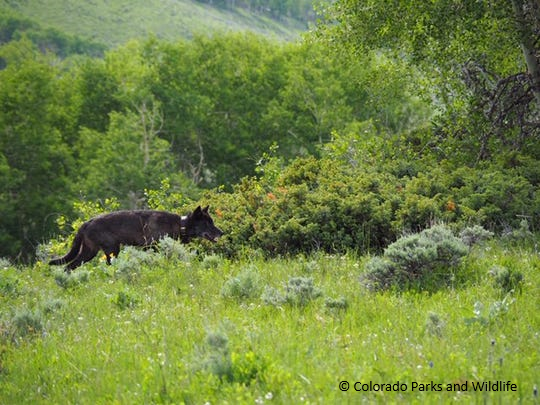In November 2020, Colorado voters approved Proposition 114, requiring the Colorado Parks and Wildlife Commission to reintroduce wolves to Colorado by 2023. Wolf recovery and management is recognized as one of the most contentious conservation issues in American West, with positive and negative impacts across a range of stakeholders.
An effective process for having a dialogue and making decisions on such a contentious issue requires a careful and skilled approach, backed by good information from biological and social sciences and from people who derive their livelihoods from the land.
With this in mind, in fall of 2019, the Center for Collaborative Conservation Fellows program invited proposals for interdisciplinary projects related to the potential need for wolf management in Colorado. These projects were expected to be science-based, use collaboration to address conservation and livelihood issues, and include outreach to communities or stakeholders that have a direct interest in the outcomes of this work.
The following policy briefs in this series report on the fellows’ research findings and their policy implications:
Policy Lessons for Colorado Wolf Reintroduction
Brielle Manzolillo and Courtney Shultz
Collaboration for Reducing Livestock-Carnivore Conflicts
Matthew Collins, Rebecca Niemiec, Jon Salerno, Courtney Shultz
Guiding Principles for Conflict Resolution
Mireille Gonzalez
Perspectives on Wolf Depredation Reporting and Compensation
Rae Nickerson, Alex Few, Becky Niemiec, Dana Hoag, Paul Evangelista


Master’s student, Human Dimensions of Natural Resources, Warner College of Natural Resources, CSU

Research Wildlife Biologist, USDA National Wildlife Research Center
A new and emerging challenge facing ranchers throughout the American West is the recovery of large carnivores in portions of their historic range. Addressing these challenges, ranching collaboratives have played important roles in minimizing carnivore-livestock conflicts and maintaining viable ranches. Yet, the process by which these collaboratives achieve success in reducing conflicts is poorly understood.
This fellowship will focus on three primary objectives: 1) Identify what factors enable the formation and potential success of rangeland collaborative conflict-prevention programs, 2) Build working relationships among project leads, collaborators, and Colorado collaboratives with an interest in forming conflict prevention programs, and 3) Communicate research findings to these Colorado collaboratives to potentially facilitate the formation of carnivore-livestock conflict-prevention programs in Colorado. To achieve the objectives, fellows will interview stakeholders from collaboratives with carnivore-livestock conflict-prevention programs in Alberta, Montana, Idaho, New Mexico, and Arizona, identifying best practices for organizing and maintaining conflict prevention programs. If implemented in Colorado, these programs would enable long-term research on best carnivore-livestock conflict management practices that can lead to economic and social sustainability of ranchers and sustainable carnivore populations.

Master’s student, Forest and Rangeland Stewardship, Warner College of Natural Resources-CSU
When Colorado passed proposition 114 in the fall of 2020, Colorado began following in the footsteps of past wolf reintroduction efforts in other states, and land managers and policy makers will start to contemplate policy approaches and management plans. Colorado Parks and Wildlife will have several years to plan for wolf reintroduction and will face questions about how to do so in a way that is effective, inclusive, equitable, and legitimate. An opportunity exists to draw on the lessons learned from past reintroduction efforts in the Greater Yellowstone Ecosystem and the Mexican wolf reintroduction area and uncover the challenges that will face Colorado specifically. This project will 1) identify how lessons learned from past wolf reintroduction efforts can inform policy and governance strategies for wolf reintroduction in Colorado, and 2) support efforts in Colorado by working with policy makers and land managers to identify the policy tools that will facilitate a successful reintroduction for both wolves and humans. Policy tools are instruments that can enable governments to solve both social and economic problems such as capacity building, educational programs, incentives, etc. The research will use a policy design lens as an analytical framework to examine the tools and governance strategies available for policy makers working in conservation.

Master’s student, Ecosystem Science and Sustainability, Warner College of Natural Resources, CSU

Northern Rockies Coordinator, Western Landowner’s Alliance, Working Wild Challenge

Ph.D. student, Human Dimensions of Natural Resources, Warner College of Natural Resources -CSU
363 Michael Smith Building
Warner College of Natural Resources
1401 Campus Delivery,
Colorado State University
Fort Collins, CO 80523
SEE MAP

Apply to CSU | Contact CSU | Disclaimer | Equal Opportunity | Privacy Statement
© 2021 Colorado State University